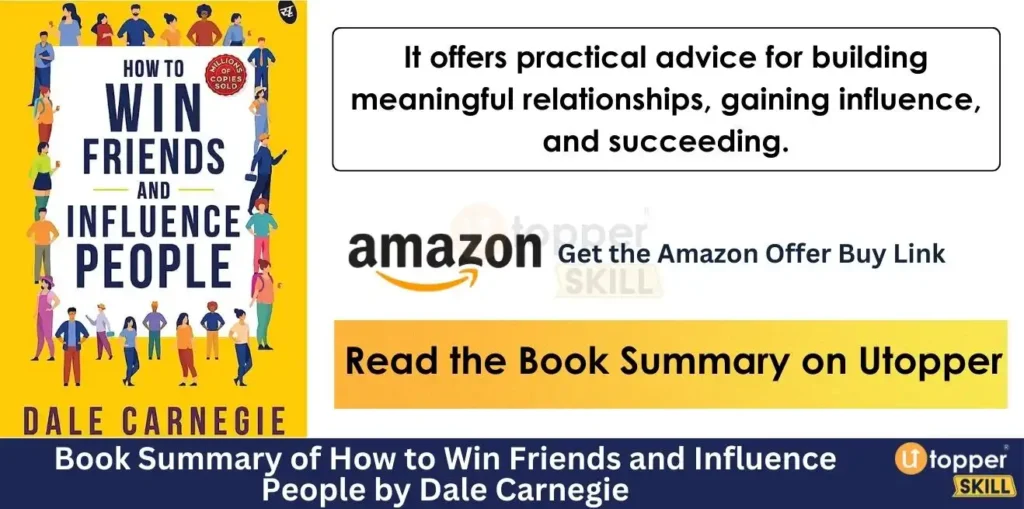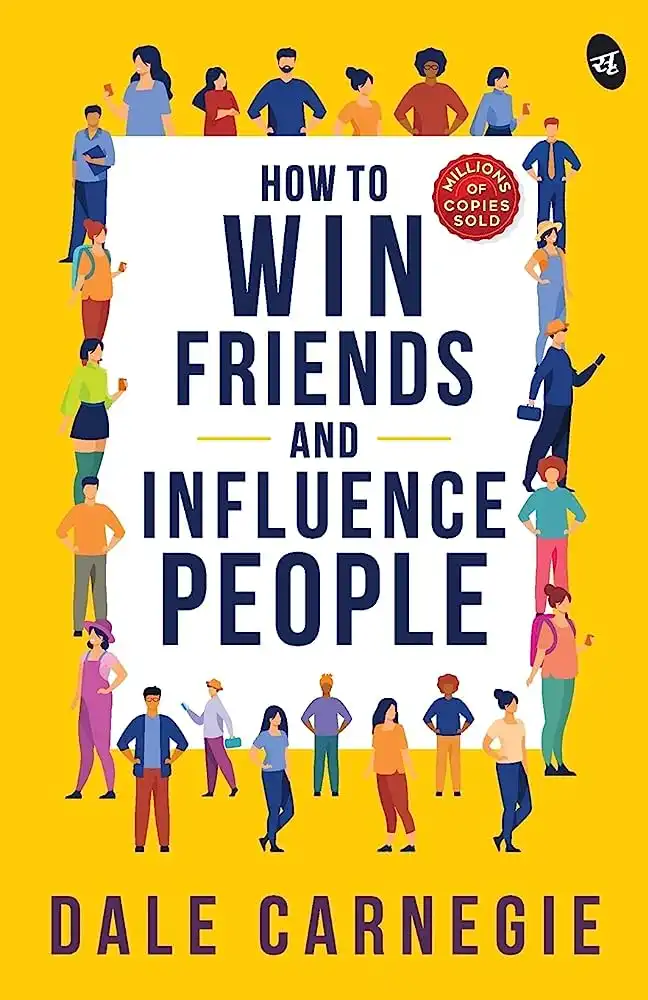[adinserter block=”1″]
Book Summary of How to Win Friends and Influence People

[adinserter block=”2″]
One of the Best lines in the Book Summary of How to Win Friends and Influence People by Dale Carnegie is: “You can make more friends in two months by becoming interested in other people than you can in two years by trying to get other people interested in you.” with 1 Line summary of How to Win Friends and Influence People, Best lines of How to Win Friends and Influence People and Best Quotes of How to Win Friends and Influence People This quote emphasizes the importance of being genuinely interested in others and building relationships based on mutual understanding and respect.
1 Line Summary of the Book
It is a timeless guide to effective communication and interpersonal skills that provides practical and actionable tips for building meaningful relationships, increasing influence, and achieving success.
Introduction
In 1936, Dale Carnegie published his iconic book, “How to Win Friends and Influence People.” Since then, it has become a timeless classic and a must-read for anyone who wants to improve their communication skills and build meaningful relationships. This book is not only relevant today, but its lessons are also more critical than ever before, given the rapid changes in technology and the way we interact with others.
In this article, we will delve into the key points of the book and explore how it can help you become a better communicator, build stronger relationships, and achieve success in both your personal and professional life.
Part 1: Fundamental Techniques in Handling People
The first part of the book focuses on fundamental techniques for handling people. Carnegie argues that people are motivated by their desires, not by logic, and that the key to influencing them is to tap into their emotions. He highlights the importance of empathy, understanding other people’s perspectives, and treating them with respect.
Some of the key points in this section include:
- “Don’t criticize, condemn or complain.” This is one of the most famous lines in the book and underscores the importance of avoiding negative language when dealing with others. Instead, focus on the positive aspects of their behavior and try to find common ground.
- “Give honest and sincere appreciation.” People crave recognition and validation, and acknowledging their efforts and achievements can go a long way in building trust and rapport.
- “Arouse in the other person an eager want.” Instead of trying to convince others to do something, focus on what they want and show them how they can achieve it. This approach can be much more effective in persuading others to take action.
[adinserter block=”3″]
Part 2: Six Ways to Make People Like You
The second part of the book outlines six ways to make people like you. Carnegie emphasizes the importance of being genuinely interested in others and making them feel important. He also stresses the need to listen actively and be attentive to their needs and concerns.
Some of the key points in this section include:
- “Become genuinely interested in other people.” Showing a genuine interest in others is the foundation of building meaningful relationships. It involves listening attentively, asking questions, and seeking to understand their perspective.
- “Smile.” A simple smile can convey warmth, openness, and positivity. It can also help to put others at ease and create a welcoming atmosphere.
- “Remember that a person’s name is to that person the sweetest and most important sound in any language.” Using someone’s name is a powerful way to make them feel valued and respected. It also helps to build rapport and establish a connection.
Part 3: How to Win People to Your Way of Thinking
The third part of the book focuses on how to win people over to your way of thinking. Carnegie argues that the key to persuading others is to appeal to their self-interest, show them the benefits of your ideas, and provide evidence to support your claims.
[adinserter block=”4″]
Some of the key points in this section include:
- “The only way to get the best of an argument is to avoid it.” Arguments rarely change people’s minds and can often create resentment and conflict. Instead, focus on finding common ground and building consensus.
- “Show respect for the other person’s opinions. Never say, ‘You’re wrong.'” Dismissing someone’s opinion can be a surefire way to create resistance and defensiveness. Acknowledging their perspective and seeking to understand it can be much more effective in building trust and rapport.
- “Let the other person feel that the idea is his or hers.” People are more likely to embrace an idea if they feel ownership over it. Involve others in the
Part 3: How to Win People to Your Way of Thinking (continued)
- “Try honestly to see things from the other person’s point of view.” Empathy is a crucial element in effective communication. Understanding others’ perspectives can help you build rapport, identify common ground, and find solutions that benefit everyone.
- “Dramatize your ideas.” People are often more responsive to ideas that are presented in a compelling and engaging way. Using vivid language, metaphors, and stories can help to capture their imagination and inspire them to action.
Part 4: Be a Leader: How to Change People Without Giving Offense or Arousing Resentment
The final part of the book focuses on how to be a leader and influence others without creating offense or resentment. Carnegie highlights the importance of leading by example, setting a positive tone, and inspiring others to follow.
[adinserter block=”7″]
Some of the key points in this section include:
- “Begin with praise and honest appreciation.” People are more receptive to feedback when it is presented in a positive and constructive way. Starting with praise can help to create a receptive atmosphere and set the tone for a productive conversation.
- “Call attention to people’s mistakes indirectly.” Criticizing others directly can create defensiveness and resentment. Instead, focus on the behavior or issue, not the person, and offer constructive feedback in a way that is non-judgmental and supportive.
- “Make the other person happy about doing what you suggest.” Framing your requests in a positive and compelling way can increase the chances of others following through. Focus on the benefits and the positive outcomes of taking action.
[adinserter block=”4″]
BUY “How to Win Friends and Influence People”
It is a timeless guide to effective communication and interpersonal skills that provides practical and actionable tips for building meaningful relationships, increasing influence, and achieving success.
Conclusion
“How to Win Friends and Influence People” by Dale Carnegie is a must-read for anyone who wants to improve their communication skills and build meaningful relationships. The book provides practical and actionable tips on how to handle people, make them like you, win them over to your way of thinking, and be a leader. By focusing on empathy, respect, and positivity, Carnegie provides a roadmap for effective communication and interpersonal skills that can help anyone achieve success in their personal and professional life.
Best Quotes of “How to Win Friends and Influence People”
[adinserter block=”2″]
- “You can make more friends in two months by becoming interested in other people than you can in two years by trying to get other people interested in you.”
- “Any fool can criticize, condemn, and complain but it takes character and self-control to be understanding and forgiving.”
- “The only way to get the best of an argument is to avoid it.”
- “Actions speak louder than words, and a smile says, ‘I like you. You make me happy. I am glad to see you.'”
- “Remember that a person’s name is to that person the sweetest and most important sound in any language.”
- “Talk to someone about themselves and they’ll listen for hours.”
- “Winning friends begins with friendliness.”
- “If there is any one secret of success, it lies in the ability to get the other person’s point of view and see things from that person’s angle as well as from your own.”
- “The royal road to a person’s heart is to talk about the things he or she treasures most.”
- “Criticism is futile because it puts a person on the defensive and usually makes them strive to justify themselves. Criticism is dangerous, because it wounds a person’s precious pride, hurts their sense of importance, and arouses resentment.”
Best Lines of “How to Win Friends and Influence People”
[adinserter block=”2″]
- “The only way to get the best of an argument is to avoid it.”
- “You can make more friends in two months by becoming interested in other people than you can in two years by trying to get other people interested in you.”
- “A person’s name is to that person, the sweetest, most important sound in any language.”
- “Criticism is futile because it puts a person on the defensive and usually makes them strive to justify themselves. Criticism is dangerous, because it wounds a person’s precious pride, hurts their sense of importance, and arouses resentment.”
- “Actions speak louder than words, and a smile says, ‘I like you. You make me happy. I am glad to see you.'”
- “Winning friends begins with friendliness.”
- “If there is any one secret of success, it lies in the ability to get the other person’s point of view and see things from that person’s angle as well as from your own.”
- “Talk to someone about themselves and they’ll listen for hours.”
- “Remember that a person’s emotional need to feel appreciated is more important than any physical need.”
- “To be interesting, be interested.”
[adinserter block=”1″]
“How to Win Friends and Influence People” By Dale Carnegie

A Guide for effective communication and interpersonal skills
- “Actions speak louder than words, and a smile says, ‘I like you. You make me happy. I am glad to see you.'”
- “Winning friends begins with friendliness.”
- “Remember that a person’s name is to that person the sweetest and most important sound in any language.”
- “Talk to someone about themselves and they’ll listen for hours.”
- “A person’s name is to that person, the sweetest, most important sound in any language.”
Lesson to Learn from “How to Win Friends and Influence People”
- The importance of empathy and understanding others’ perspectives
- The value of treating others with respect and kindness
- The power of positive language and avoiding criticism or negativity
- The need to listen actively and attentively to others
- The benefits of recognizing and appreciating others’ efforts and achievements
- The value of framing ideas and suggestions in a way that appeals to others’ self-interest
- The importance of leading by example and setting a positive tone
- The benefits of finding common ground and building consensus rather than arguing or criticizing
- The value of using language that is clear, concise, and compelling
- The need to make others feel important and valued.
Frequently Asked Questions on “How to Win Friends and Influence People”
Q.1 How can I make someone like me?
According to Carnegie, one of the best ways to make someone like you is to show a genuine interest in them. Ask them questions, listen actively, and try to understand their perspective. Smile and use their name when you talk to them. Show appreciation for their efforts and achievements.
Q.2 How can I persuade someone to see my point of view?
Instead of trying to force your ideas on others, focus on their self-interest. Show them how your ideas can benefit them and provide evidence to support your claims. Find common ground and build consensus rather than arguing or criticizing.
Q.3 How can I give feedback without offending someone?
Carnegie suggests starting with praise and honest appreciation before giving constructive feedback. Focus on the behavior or issue, not the person, and offer suggestions for improvement in a way that is supportive and non-judgmental.
Q.4 How can I be a good leader?
According to Carnegie, being a good leader involves leading by example, setting a positive tone, and inspiring others to follow. It also involves showing respect for others’ opinions and needs, acknowledging their efforts and achievements, and framing ideas in a way that appeals to their self-interest.
Q.5 How can I handle difficult people?
Carnegie advises that one should not criticize, condemn, or complain when dealing with difficult people. Instead, try to understand their perspective, show empathy, and find common ground. Focus on positive language and behavior and avoid negative language and criticism.
Q.6 How can I communicate more effectively?
Effective communication involves active listening, empathy, and clear and concise language. It also involves using positive language and avoiding criticism or negativity. Show respect for others’ opinions and perspectives, and try to find common ground and build consensus.
Q.7 How can I build meaningful relationships?
Building meaningful relationships involves showing a genuine interest in others, treating them with respect and kindness, and actively listening to their needs and concerns. It also involves showing appreciation for their efforts and achievements and finding common ground and shared interests.
Q.8 How can I increase my influence?
To increase your influence, Carnegie suggests focusing on others’ self-interest, framing ideas in a way that appeals to them, and providing evidence to support your claims. Show respect for others’ opinions and needs, acknowledge their efforts and achievements, and lead by example.
